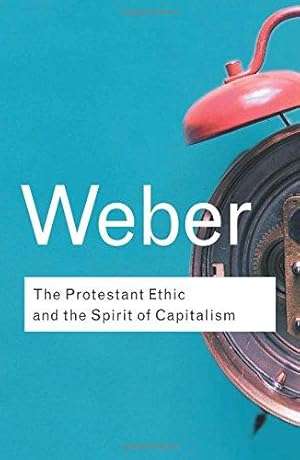Routledge Classics, 2007, softcover, index, 272 pages, condition: as new.
Max Weber's best-known and most controversial work, The Protestant Ethic and the Spirit of Capitalism , first published in 1904, remains to this day a powerful and fascinating read. Weber's highly accessible style is just one of many reasons for his continuing popularity. The book contends that the Protestant ethic made possible and encouraged the development of capitalism in the West.
Webers most famous study has its focus in the Calvinists. Calvin established a new kind of saintliness for merchants and artisans living first of all in Geneva, but later in London, Amsterdam and Edinburgh and then further afield. The piety of the Calvinists had strong echoes of an older piety found in the best of the monasteries. Like the monks, the life of a dutiful Calvinist was one of hard work and diligence, frugality and seriousness with little frivolity. Since everything was pre-ordained, this life of obedience and frugality could not be hoped to bring salvation. Rather, it was a mere subservience to Gods Law which, in Calvins system, replaced the Rule of the great monastic leaders. Calvinism also claimed the right of the Elect to rule over the non-Elect in a theocratic political system.
The monks, in pursuing pious obedience, poverty and chastity had inadvertently made their houses and their orders rich. So it was with the pious businessmen. They too lived frugally and worked hard. Without really intending to, the Calvinists made themselves and their households rich. This was the so-called Protestant ethic identified by Weber as giving birth to capitalism.
After the Great War, Calvinism slipped finally from view, overtaken, diluted and absorbed by the Arminian doctrine that now became Protestant conservative or evangelical orthodoxy. Protestants conservatives were now universally enjoined to turn to God, to confess their sins and put their trust in a God who would reciprocate by offering salvation. The few people who still called themselves Calvinists merely emphasised the last part of this process, the positive activity of God. There were still other movements within Protestantism, the enlightened theology of the Quakers or the Unitarians, for example, and the High Church found in Anglicanism, both of which, however, were more important as belonging to the liberal camp. But it was now a different theological world.

